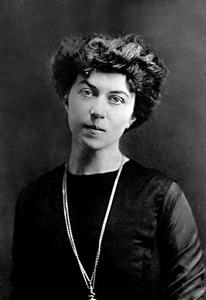

Queer Places:
Novodevichy Cemetery
Moscow, Moscow Federal City, Russia
 Alexandra Mikhailovna Kollontai (31 March [O.S.
19 March] 1872 – 9 March 1952) was the first woman Ministerial Office (People’s
Commissar for Social Welfare, Russia) in 1917.
Alexandra Mikhailovna Kollontai (31 March [O.S.
19 March] 1872 – 9 March 1952) was the first woman Ministerial Office (People’s
Commissar for Social Welfare, Russia) in 1917.
She was a Marxist revolutionary, first as a member of the Mensheviks, then from 1915 on as a Bolshevik (later Communist). She rejected Emma Goldman’s criticism of Bolsheviks; Goldman met her in Russia; and was “chilled to the marrow of my bones” at her indifference to the betrayal of the revolution. The passionate protector of minority rights and director of the Children’s Bureau, Grace Abbott, was pilloried for her association with the pacifist and suffrage movements, and was alleged to be involved in a sinister alliance with the Russian communist revolutionary Alexandra Kollontai, People’s Commissar for Social Welfare in the new Soviet republic in 1917.
In 1922, Kollontai was appointed a diplomatic counsellor to the Soviet legation in Norway, being soon promoted to head of the legation, one of the first women to hold such a post.
Her novel Red Love (1927) tells the story of a young woman Vassilissa (Sascha Hammer) who breaks with her early ideals to enter into a conventional bourgeois marriage and learns how to stand up to her womanizing husband (Mark Eins). It is the basis of Red Love, a 1982 German documentary film directed by Rosa von Praunheim. The film, divided in two interspersing completely different segments, deals with two women deprived of independence for many years because of either their family obligations or an authoritarian spouse.
In 1890 or 1891, Alexandra, aged around 19, met her cousin and future husband, Vladimir Ludvigovich Kollontai (July 9, 1867 - July/August, 1917), an engineering student of modest means enrolled at a military institute.[10][11] Alexandra's mother objected bitterly to the potential union since the young man was so poor, to which her daughter replied that she would work as a teacher to help make ends meet.
Her parents forbade the relationship and sent Alexandra on a tour of Western Europe in the hope that she would forget Vladimir, but the pair remained committed to one another despite it all and married in 1893.[13] Alexandra became pregnant soon after her marriage and bore a son, Mikhail, in 1894. She devoted her time to reading radical populist and Marxist political literature and writing fiction.[14]
Years later, she wrote about her marriage, "We separated although we were in love because I felt trapped. I was detached, [from Vladimir], because of the revolutionary upsettings rooted in Russia". In 1898 she left little Mikhail with her parents to study economics in Zürich, Switzerland, with Professor Heinrich Herkner. She then paid a visit to England, where she met members of the British socialist movement, including Sidney and Beatrice Webb. She returned to Russia in 1899, at which time she met Vladimir Ilych Ulyanov, better known today as Vladimir Lenin.
During the revolutionary period, at the age of 45, she married the 28–year–old revolutionary sailor Pavel Dybenko, while keeping her surname from her first marriage.[e]
She was the most prominent woman in the Soviet administration and was best known for founding the Zhenotdel or "Women's Department" in 1919 . This organization worked to improve the conditions of women's lives in the Soviet Union, fighting illiteracy and educating women about the new marriage, education, and work laws put in place by the Revolution. It was eventually closed in 1930.
Kollontai's views on the role of marriage and the family under Communism were arguably more influential on today's society than her advocacy of "free love."[39] Kollontai believed that, like the state, the family unit would wither away once the second stage of communism became a reality. She viewed marriage and traditional families as legacies of the oppressive, property-rights-based, egoist past. Under Communism, both men and women would work for, and be supported by, society, not their families. Similarly, their children would be wards of, and reared basically by society.
Kollontai admonished men and women to discard their nostalgia for traditional family life. "The worker-mother must learn not to differentiate between yours and mine; she must remember that there are only our children, the children of Russia's communist workers." However, she also praised maternal attachment: "Communist society will take upon itself all the duties involved in the education of the child, but the joys of parenthood will not be taken away from those who are capable of appreciating them."[43]
My published books: